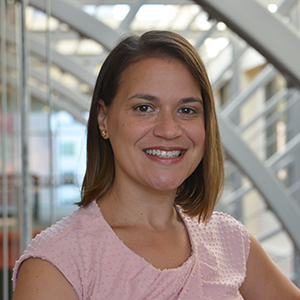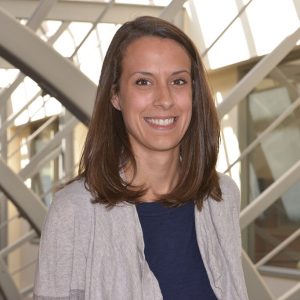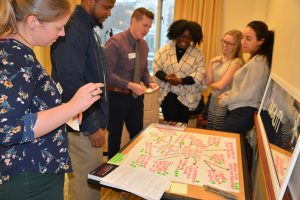UConn’s Department of Educational Leadership (EDLR) offers a rich and diverse curriculum that prepares both undergraduate and graduate students to be educational leaders in our ever-changing world. The “Courses and Curriculum” series highlights innovative courses within EDLR’s catalog that are changing the education game for the better.
The Department of Educational Leadership’s (EDLR) master’s program in Higher Education and Student Affairs (HESA) boasts a robust curriculum that prepares students to be well-rounded and reflective student affairs practitioners. EDLR 5105: Structured Group Dialogue in Student Affairs is both an innovative and integral part of the HESA curriculum, giving students a space to consider how dialogue, and intergroup dialogue specifically, can be a tool to explore their own racial identity and socialization, as well as the identities and processes of socialization of others. Students in the course are continually asked to reflect on the personal, professional, and educational implications of their learning. These insights and processes help the students learn how to dialogue with others who have varying perspectives given their own identities and socialization– a much-needed process on college campuses today.

Students in EDLR 5105 engage in dialogue with each other as an entire class as well as in smaller, intra-class groups. One of the major aspects of the course is the Intergroup Collaboration Project (ICP), which, as the closing project for the course, encourages action as a result of learning. Students work alongside their cohort members in assigned groups to create visual representations of their learning, specifically around race and intergroup dialogue in student affairs practice. Through the ICP projects, students dialogue across differences to arrive at an understanding of that year’s selected theme: in 2016, the theme was “allyship;” in 2017 it was “social responsibility;” and in 2018 it was “disrupting race talk.” These visual representations are then shared with the larger UConn community in the form of a HESA Gallery Walk, which engages the larger UConn community in dialogue about race and higher education.
The course is co-taught by Dr. Milagros Castillo-Montoya (she/her/hers) and Danielle DeRosa (she/her/hers). It was Castillo-Montoya who lead the charge several years ago to update HESA’s existing groups-based course. As part of her research on teaching in higher education, she had begun to explore intergroup dialogue, and in the winter of 2015 she was part of a six-person UConn delegation that attended the University of Michigan’s intergroup dialogue training program. Upon her return, she worked with the department chair to incorporate her valuable training into the course, which was first offered in its renovated form in the fall of 2016. The course, which follows the University of Michigan model, is co-taught by design: its two instructors have different social identities which are aligned with focus of the course. In UConn HESA’s case, the central focus of the course is race.
The course is divided into four phases: Forming and Building Relationships, Exploring Differences and Commonalities of Experience, Exploring and Dialoguing About Contentious Issues, and Alliance Building and Social Responsibility. In each phase, says DeRosa, students are both learners and teachers: “My favorite part of teaching this course is learning with and from our students. Students in the HESA program think deeply about the ways in which college campuses can be more inclusive. As a community, we are each able to contribute from our own unique perspectives and lived experiences.”
Castillo-Montoya reaffirms the importance of bringing one’s unique identities and experiences to the course. “My lived experience as a Latina, first-generation college graduate from a low-income background informs my teaching of this course. So does my research expertise in teaching and learning in higher education,” says Castillo-Montoya. “From these experiences, I understand that the content of the course isn’t something ‘out there’ to be learned; it is inside each of us as we unpack our own assumptions and understandings about ourselves, others, and society relative to race. Then we can consider how those things impact our practice”

For DeRosa, her experience working with Husky Sport, a campus-community partnership between UConn and a community in the North End of Hartford, has been important to her ability to complexly and responsibly co-teach this course. “I have had to examine my own positionality as a white woman engaged in work in a neighborhood mostly comprised of people of color. I’ve had to do a lot of the work that we are asking our students to do in the course, and this is work that I continue to invest in; the process of learning about and unlearning our own socialization never ends. It can be helpful to share the journey of understanding my own racial identity as I connect with students.”
Kayla Moses (she/her/hers, HESA ‘20), a student in the course this past fall, says she has learned a great deal about the impact of socialization and the power of her identity. “Within the context of this course, I became more aware of how the world around us, along with our personal stories, can impact the way that we think and develop,” says Moses. “I became more aware of my position as a woman of color and how that has affected my learning. This course allowed me to not only expand my understanding of how my identity can help me relate to my current and future students of color, but also to realize that sharing the load with white peers and colleagues is the only way that this work can be done effectively.”
Fellow student Steven Feldman (he/him/his, HESA ‘20) says that the course opened his eyes to important differences between one-on-one and group dialogue. “In one-on-one conversations, it is more difficult to avoid or disengage from conversations about race, but in group conversations, it is easier to fall into racialized scripts of behavior,” says Feldman. “When this happens, white folks like me tend to stay silent either because we do not feel like we have the tools to talk about race yet or because we are experiencing the discomfort of talking about race. This course challenged me to reflect on my identities and consider the consequences of my words and behaviors in group contexts.”

Castillo-Montoya and DeRosa, who just completed their third year teaching this course together, say it was their best co-teaching semester yet. Along with several of their students, they recently presented on the course at the 2019 ACPA (College Student Educators International) Annual Convention in Boston, Massachusetts. “Having this course makes UConn HESA one of only a handful of programs in the country that includes education on intergroup dialogue as part of their curriculum for future higher education and student affairs practitioners,” says Castillo-Montoya. “Practitioners in the field are increasingly competent in social justice and inclusion, and we want our graduates to be well prepared for their work with diverse students on diverse college campuses.”
“EDLR as a department has supported the development of this course from the outset,” says department head Dr. Jennifer McGarry. “We sent several faculty members to participate in the intergroup dialogue training at the University of Michigan, supported time and space to share about that experience, and encouraged the faculty who took part to integrate their learning with other opportunities to study, participate in, and lead dialogue about race. EDLR is committed to the course, the instructors, and the students: we see this teaching and learning as integral to who we are and what we value.” EDLR 5105 aligns with the Department of Educational Leadership’s mission to “inspire and cultivate innovative leaders for positive change” and Neag’s mission to develop leaders dedicated to improving education for all. The Department of Educational Leadership is proud to have talented teachers such as Dr. Milagros Castillo-Montoya and Danielle DeRosa doing the important work of opening and deepening dialogue on college campuses and beyond.